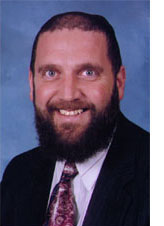By Rabbi Baruch Lederman

SAN DIEGO–“V’nikdashti bsoch Bnei Yisroel” “I shall be sanctified among the Children of Israel” (Lev 22:32)
It is our mission in life to sanctify G-d’s name and spread Torah values. Sometimes we don’t think our good actions are having effect. Try as we might, we feel as though we are talking to a wall. We are left frustrated.
The truth is, talking to a wall could be a good thing, as the following true story submitted by Eddie (Nachum) Rosenberg, illustrates:
Rav Neta Weiss was a noted maggid (lecturer) in old Jerusalem. Every Shabbos afternoon he would deliver a drasha (sermon) in a shul in the Old City. One Shabbos it was scorching, fry-an-egg-on-the-sidewalk hot.
The time came for him to leave for his weekly drasha and for a split second, he thought of not going to the shul.
Surely no one would even be there on such a sweltering day. At that moment, he thought of his parents. He thought of how they always did their jobs with good faith, be they pleasant or unpleasant.
Fortified, he trudged forward in the stifling heat, convinced it was a waste of time. When he reached the shul and entered, what do you think he found?
He found an empty shul. His first thought was to sit a spell to rest up, then head back home. Then he thought about his parents. He thought of their consistency. He remembered how they took a quiet pride in every task they did, even those that seemed mundane.
Rav Neta gave his drasha because that is what he did. He gave weekly drashas.
Fully inspired, fully charged, Rav Neta gave his full drasha with his best effort. He spoke with passion, and emotion. He spoke with wit and wisdom, with drama and flare. He bellowed, he whispered, he cried. He spoke for over an hour – to an empty room. All this work for a drasha no one heard. He was literally talking to the wall.
As he was about to leave, he heard a sound of sobbing coming from behind a partition. He walked over and found a young man. With tear stained eyes, he explained to the Rav that he was not from a Torah observant background.
In fact the only reason he was in a shul at all was because he was walking in the neighborhood and found the heat to be unbearable. He ducked into the shul to escape the dreadful heat. While he was there, he laid down and fell asleep.
He was awakened by Rav Neta’s drasha. At first he listened passively, then he was entertained, then he was enraptured. Indeed he was awakened in more ways than one; for something in the core of his soul stirred. He wanted to do teshuvah (repentance), he wanted to return to Hashem. His desire was as intense as it was heartfelt.
Rav Neta befriended the young man. One thing led to another. The young man learned more and more till eventually he became a fully observant and learned Jew. He went on to marry a wonderful woman. Their children and grandchildren led observant lives fully dedicated to Torah and Mitzvos.
[The foregoing true story is documented in Meoros HaShabbos, Vol 4, P 17.]
Dedicated by Linda Holman in honor of all of our mothers on Mothers Day.
*
Rabbi Lederman is spiritual leader of Congregation Kehillas Torah in San Diego